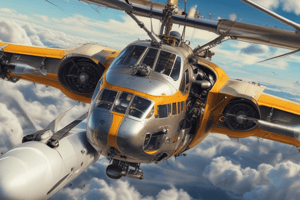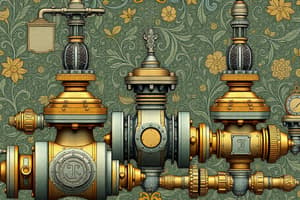Podcast
Questions and Answers
What type of check valve is used for high flow rate applications?
What type of check valve is used for high flow rate applications?
- Inline Check Valve
- Restriction Check Valve
- Shuttle or Double Check Valve
- Right Angle Check Valve (correct)
What is the purpose of a check valve in a combination pump?
What is the purpose of a check valve in a combination pump?
- To prevent back flow in the system (correct)
- To control the flow rate of the pump
- To increase the pressure in the system
- To filter the fluid in the system
What is the function of a pilot-operated check valve?
What is the function of a pilot-operated check valve?
- To allow free flow in one direction and permit flow in the opposite direction only if pilot pressure is applied (correct)
- To filter the fluid in the system
- To control the temperature of the fluid
- To regulate the flow rate of the fluid
What type of check valve can maintain a set flow rate regardless of changes in load pressure and fluid temperature?
What type of check valve can maintain a set flow rate regardless of changes in load pressure and fluid temperature?
What is the function of a shuttle or double check valve?
What is the function of a shuttle or double check valve?
In what type of circuit is a check valve typically used to protect a blocked filter?
In what type of circuit is a check valve typically used to protect a blocked filter?
What are the three essential types of control valves based on their configuration or modes of operation?
What are the three essential types of control valves based on their configuration or modes of operation?
What is the main advantage of seat valves?
What is the main advantage of seat valves?
What is the function of lands in a spool valve?
What is the function of lands in a spool valve?
What is the primary way to specify a directional control valve?
What is the primary way to specify a directional control valve?
What is the characteristic of poppet valves that makes them suitable for low pressure applications?
What is the characteristic of poppet valves that makes them suitable for low pressure applications?
What is the primary function of directional control valves?
What is the primary function of directional control valves?
What type of design is typical for three-way directional control valves?
What type of design is typical for three-way directional control valves?
How many control positions does a 4/3-way valve have?
How many control positions does a 4/3-way valve have?
What is the primary advantage of directional control valves?
What is the primary advantage of directional control valves?
What is the characteristic of a pilot-to-close valve?
What is the characteristic of a pilot-to-close valve?
What represents the number of connected lines in a valve specification?
What represents the number of connected lines in a valve specification?
What is an advantage of rotary spool valves?
What is an advantage of rotary spool valves?
What is a characteristic of a sliding spool valve?
What is a characteristic of a sliding spool valve?
What is the function of a check valve?
What is the function of a check valve?
What is cracking pressure in a standard check valve?
What is cracking pressure in a standard check valve?
What is a type of directional control valve?
What is a type of directional control valve?
What is a disadvantage of sliding spool valves?
What is a disadvantage of sliding spool valves?
Flashcards are hidden until you start studying
Study Notes
Types of Check Valves
- Right-Angle Check Valve: used for high flow rate applications
- Inline Check Valve: used to prevent back flow in any line where it cannot be tolerated
Check Valve Applications
- In a combination pump
- In accumulator circuit
- To protect a blocked filter by diverting flow around the filter when accumulator pressure rises
- In the tank return, to prevent fluid being sucked out of the tank when the pump is turned off
Restriction Check Valve
- Used to control the speed of the actuator by adjusting the flow rate at which a fluid is admitted to, or allowed out from, a device
- Can be pressure and/or temperature compensating to maintain the set flow rate regardless of changes in the load pressure and fluid temperature
Shuttle or Double Check Valve
- Permits flow from either of two inlet ports to a common outlet
- A free-floating metal ball shuttles according to the relative pressure at the two inlets
Pilot-Operated Check Valve
- Always permits free flow in one direction but permits flow in the normally blocked opposite direction only if pilot pressure is applied at the pilot pressure port of the valve
- A pilot-to-open check works as a regular check valve when no pressure is applied to the pilot port
- The pilot-to-close valve presents the opposite behavior
Directional Control Valves
- Specified by the number of connected lines (ports) and the number of control positions
- Example: 4/3-way valve, 3-way valve, 2/2-way valve
Three-Way and Four-Way Valves
- Three-way valves contain three ports and are typically of the spool design
- Four-way valves contain four ports and have different positions (e.g. Position 1, Position 2, No Flow, Position 3)
Hydraulic Control Valves
- Basic components of a hydraulic system: valves, hydraulic control valves
- Types of hydraulic control valves: directional control valves (DCVs), pressure control valves (PCVs), flow control valves (FCVs)
Directional Control Valves Configurations
- Seat valve: simple in design, robust, low cost, less sensitive to fluid contamination, low maintenance
- Disadvantages of seat valve: force required to operate is more, suitable mostly for low pressure applications
- Sliding spool valve: less force required to actuate, actuation force unaffected by changes in operating pressure
- Disadvantages of sliding spool valve: lower flow rate, more seal wear, short product life, more susceptible to contamination, higher cost and maintenance
- Rotary spool valve: less force required to actuate, simple and compact in size
- Disadvantages of rotary spool valve: more seal wear, short product life, more susceptible to contamination, higher cost and maintenance, higher leakage
Directional Control Valves Actuation
- Means to switch the valve from one position to another
- Classified into: check valve, pilot-operated check valve, three-way valves, four-way valves
Studying That Suits You
Use AI to generate personalized quizzes and flashcards to suit your learning preferences.




